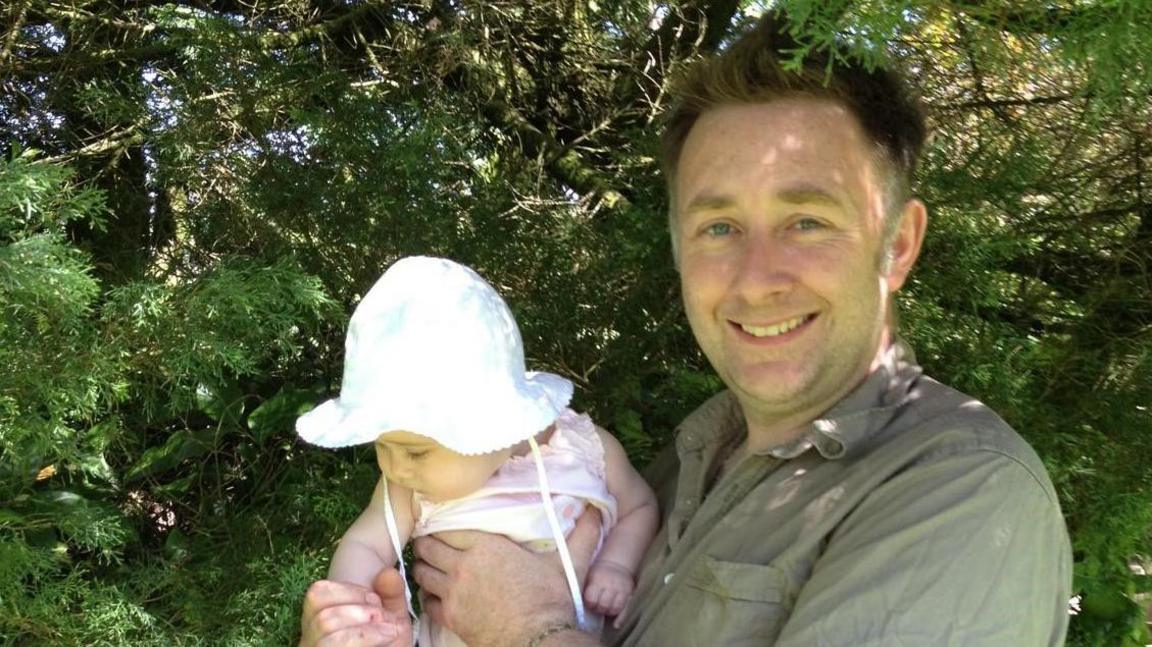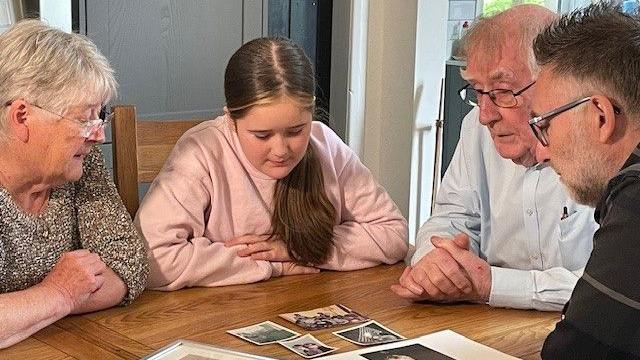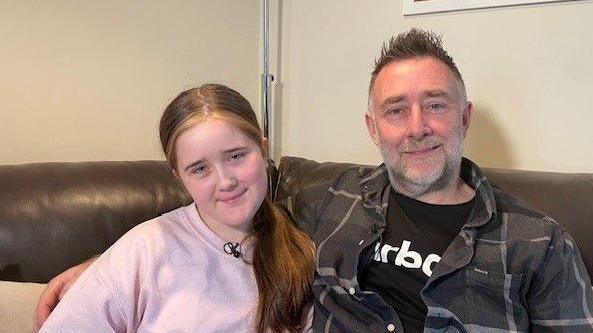Infected blood scandal haunted family for decades

John Morrissy had to delay starting a family for six years while he endured gruelling treatment
- Published
A victim of the infected blood scandal said it has "devastated" three generations of his family.
John Morrissy, of Blackrod, Greater Manchester, was one of more than 30,000 people in the UK given contaminated blood products in the 1970s and 1980s.
The 56-year-old said he believed he was infected with hepatitis C as a child.
He said he had to delay starting a family for six years while he endured gruelling treatment for his illness.

Mr Morrisy says the infected blood scandal has affected three generations of his family
'No choice'
Mr Morrissy was a baby when his parents were told he had haemophilia B, a genetic condition affecting the blood's ability to clot, and that he was deficient in a protein called Factor IX.
In the 1970s and 1980s, the UK struggled to meet the demand for a replacement made from donated human blood plasma, and often bought it from the US.
But some of this was bought from high-risk donors such as prison inmates and drug-users, and plasma was pooled from tens of thousands of donors.
If just one was carrying a virus, the entire batch could be contaminated.
Mr Morrissy's parents recalled labels on the bottles he injected himself with stating that the product was made "with blood from 2,000 donations".
Mr Morrissy said he was "angry pharmaceutical companies and governments would think it was a good idea to pay people who were in really stressful, bad times in their lives for blood donations and that that would ever be safe".
He said there had been rumours about the US-made products being contaminated, and had been nervous about injecting himself with them.
But he said he ultimately had "no choice".
More than 3,000 NHS patients are believed to have died after being infected with HIV and hepatitis C between 1970 and 1991 through contaminated blood products.

Mr Morrissy's daughter Orla said the scandal had "really affected" her father
His mother, Maureen Morrissy, said: "I remember John sitting at the kitchen table with a syringe-full, wondering whether to put this into himself or not... because he had a feeling this could be very very wrong.
"And yes, we were right."
Mrs Morrissy said the number of donations used to make the Factor IX meant "you don't stand much chance avoiding infection if there's any around".
His father, also called John, added it was a "disgrace".
Orla, Mr Morrissy's 12-year-old daughter, said the contaminated blood scandal had "really affected" her father and "lots of people around the world".
UK blood donations were not routinely screened for hepatitis C until 1991.
MPs have described the scandal as the worst treatment disaster in NHS history.
Sir Brian Langstaff, who led the inquiry which started in 2018, advised compensation payments of £100,000 be made to victims and some bereaved families.
The payments were made in 2022, and in April last year, Sir Brian recommended a final compensation scheme be set up.
The total cost likely to run into billions of pounds, and the children and parents of those infected will be offered interim payments.
The government has said it accepts the moral case for compensation.
'Appalling tragedy'
A Cabinet Office spokesman said: "This was an appalling tragedy that never should have happened.
"We are clear that justice needs to be done and swiftly, which is why have acted in amending the Victims and Prisoners Bill.
“This includes establishing a new body to deliver an Infected Blood Compensation Scheme, confirming the Government will make the required regulations for it within three months of Royal Assent, and that it will have all the funding needed to deliver compensation once they have identified the victims and assessed claims.
“In addition, we have included a statutory duty to provide additional interim payments to the estates of deceased infected people.
“We will continue to listen carefully to the community as we address this dreadful scandal."
Listen to the best of BBC Radio Manchester on Sounds and follow BBC Manchester on Facebook, external, X, external and Instagram, external? You can also send story ideas to northwest.newsonline@bbc.co.uk, external
- Published3 February 2023
- Published13 May 2024
- Published17 August 2022
- Published17 August 2022
- Published26 June 2021
- Published14 May 2024